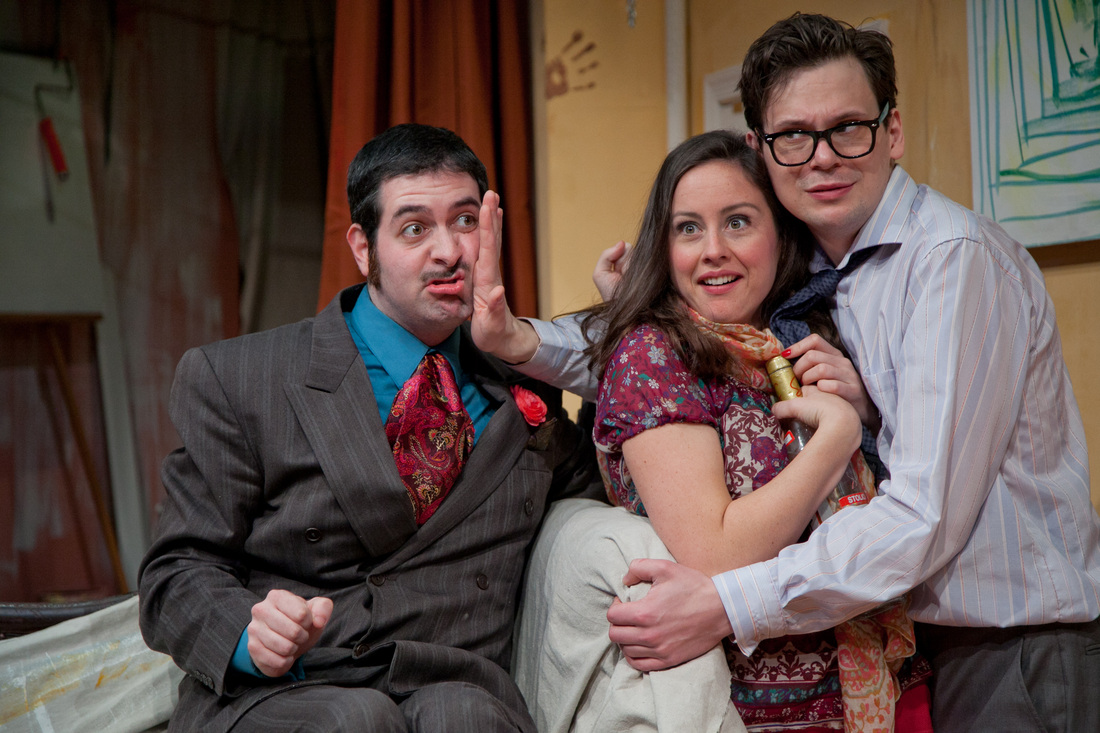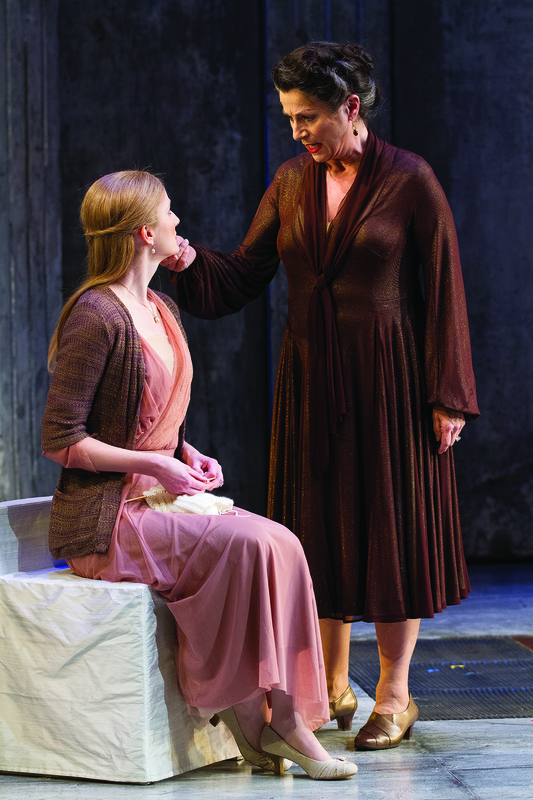|
JACQUELINE LAWTON: Why did you decide to get into theatre? Was there someone or a particular show that inspired you?
RJR: I wouldn’t say I’m from an artsy family, but I am from a family that loves music and musicals. In the 1980s, my Grandfather Stein was active in a Baltimore-based community theater called the Senior Star Showcase. So my earliest theatergoing memory is seeing my then-septuagenarian grandfather playing Ali Hakim in Oklahoma. JL: How long have you lived and worked as a theatre critic in D.C.? What brought you here? Why have you stayed? RJR: I moved to DC in 2007 to take a two-year contract position at the National Endowment for the Arts. I wrote a few theater previews for the Post later that year, and always looked for ways to cover DC theater for publications in other cities. (Reviewing the August Wilson cycle for the Post Gazette, interviewing a Maine congresswoman who acted in “Will on the Hill” for the Press Herald, etc.) In 2011, I started regularly reviewing theater for City Paper. JL: How do you define the work you do? Specifically, what is the role of the theatre critic in the world of theatre? What contribution do you hope to make in the D.C. theater community and the American theater? RJR: Theater journalists should be knowledgeable audience members with specialized writing skills. In my case, I’ve been writing about theater professionally for 13 years (19 if you count my student years) and have a master’s degree in arts journalism. I’ve studied drama from a literary perspective in college, and from an actor’s perspective in grad school, so I’d like to think I offer an informed viewpoint. A few months ago, TheatreWashington’s Rachel Grossman interviewed Post critic Peter Marks, and they came up with a cool Venn diagram depicting Peter’s observatory role. I rather liked that. I’m writing for the people who are thinking about buying tickets; in the case of City Paper, I imagine culturally vociferous young professionals. I’d like to think I’m helping steering them towards good shows, and away from subpar ones. I’m always thrilled to see a theater tweet that I show I reviewed positively is sold out. JL: If your work as a theatre critic doesn’t pay the bills, what else do you do? How do you balance this work with your play viewing and criticism? RJR: I am an adjunct professor in the University of Maryland’s professional writing program. I have been known to sing showtunes in class. My answer to “What do you do?” is always that I’m a writing professor and a journalist. I don’t identify as a theater critic. I write about dance (and occasionally theater) for the Post, and I interview local artists for American Craft magazine. I am my neighborhood’s go-to cat-sitter, and I was a stringer for the Associated Press on Election Night. You get the idea. I am always working. JL: What skills and traits do you feel a successful theater critic should have when writing about theatre, especially when it comes to new plays? RJR: When it comes to new plays, it’s important to be knowledgeable about the theater ecosystem. What workshopping opportunities are out there? Did this company take advantage of them? If the play is recent but not a premiere, where else has it been staged? I’m fortunate to know many writers from across the country through the American Theatre Critics Association. If I’m reviewing a new(ish) play, I seek out previews written by a colleague I respect. JL: What is your writing and viewing process? Do you read the script prior to seeing a production? Do you research the author and/or world of the play? Do you read the program notes? RJR: If I’m seeing a classic, I do try to reread at least a few scenes. I have to admit that how I prepare has changed over the years. Before going to grad school, I had a staff writer position at the Intelligencer Journal in Lancaster, Pa. I had several beats, but in terms of theater, I was only covering two companies, one touring venue and a few colleges. I had guaranteed steady income, so on my own time, I would do things like read scripts, or make a point of seeing a play in other city before it came to Lancaster. As a freelancer, there is no such thing as “your own time.” I do what I can. As for program notes, I often skip the director’s comments, because I don’t like reading, “Here is what I’m trying to do.” But I do appreciate well written dramaturgical notes. JL: In the article, “Ohio Critic's Tough Words Elicit Rough Reaction,” Denver Post Theater Critic John Moore states: “There is no universal rule book for criticism, no how-to manual. My guidelines: Be true to your visceral emotional response, good or bad. State your case and back it up. Be a catalyst for discussion. Encourage dialogue. Don't be personal. Never try to be funny at the expense of someone's feelings.” What guidelines, rules or standards do you have for your own work? Have you always upheld them? If so, at what cost? If not, what shifted the line for you? RJR: That’s a great list. I would add that it’s important not to review people who you also socialize with. Years ago, I met a young director who was in Lancaster on a Princess Grace fellowship. I interviewed him before a premiere, and thought he was cool. (There weren’t many artsy young people around.) But the show sucked. I figured that was that. The next time I saw him, he came up to me and said, “You were right. In fact, you were generous. That play was terrible. Can we hang out?” We did, but that meant his next show didn’t get reviewed. Instead, I consulted on the script and even helped give rehearsal notes. I’d like to think that was a good experience for both of us, but only because initially, I stuck to my principals. JL: What is the greatest part of being a theatre critic? What has been your most difficult challenge? RJR: Seeing a good show, then coming home and sitting down at my computer, and trying to transfer one art form to another. JL: Who are your favorite playwrights? What is it about their work that inspires or draws you to them? RJR: Shakespeare and Moliere. Thank God for the 1993 Kenneth Branagh Much Ado About Nothing. I loved that movie so much, I started reading Shakespeare for fun. I was like, 14. But I never saw a professional production of a classic play—unless you count school assemblies—until I was in college. A somewhat doddering professor took all the English majors to the Stratford Festival every year. Finally, I understood why good theater onstage was much more powerful than words on the page, or on VHS. JL: DC artistic directors … RJR: Need to get out more. I see Janet Griffin (of the Folger) and Michael Kahn (of Shakespeare) around town at other theaters. Bravo. I get that you’re busy and working nights, but I am too. Go see other people’s shows. Go see dance. Go to Fringe. Find artists you’d like to collaborate with. JL: DC actors, designers and directors are … RJR: Designers are doing amazing things, often with limited means. DC actors do amazing things despite holding down day jobs. DC directors are diplomatic, and manage to work for multiple theaters. I’m so glad they do. JL: DC playwrights are … RJR: Scrappy multitaskers. JL: DC audiences are … RJR: Mature and well educated. I was in the lobby at intermission recently for a Sunday matinee. The play was pretty new, and I heard a gentleman say, “I miss the old Irish comedies.” I was one of five people under 40. I think some of us writer-types have been too hard on local theaters for not being bolder with their programming. No Rules Theatre Company opened its season with Black Comedy, a play from the 60s that I’d never seen—and I loved—but clearly it had some resonances with older audience members. I thought that was so, so smart. We have so many young theater companies around here, but they won’t survive unless they find a way to be innovative without alienating. JL: How do you feel the DC theatre community has addressed the issues of race and gender parity? How has this particular issue impacted you and your work? RJR: Here’s the thing: Women have come sooooo much farther in North American theater than they have in music and dance. Take the New York City Ballet’s May American Music Festival, for example. Three weeks of performances, and not a single female composer or choreographer. I’m not saying theater should rest on its laurels, but there are reasons why women are more prominent in leadership and artistic positions. There are some great grant and mentorship programs out there. Figure out what’s working, celebrate it, and keep doing it. Are there times when I disagree with a male colleague, and think gender was the reason? Certainly. I loved Leslye Headland’s play Bachelorette at Studio last year. The other three City Paper critics are men, as is our editor. I heard from some guys who thought the show was too mean, but I doubt any other them had ever planned a bachelorette party. It’s also important for theater critics to remember that the majority of their readers are likely female, because the majority of theatergoers are female. (See the NEA’s 2008 arts participation survey.) With all due respect, it’s statistically silly to drop Bruce Springsteen and Die Hard allusions into theater reviews. We have to think about our readers, just like theaters have to think about audiences. JL: What advice do you have for an up and coming DC based theatre critic who has just moved to the area? RJR: Get a high-paying, low-stress day job, and get writing.
0 Comments
Your comment will be posted after it is approved.
Leave a Reply. |
My BlogI'm a playwright, dramaturg, and teaching artist. It is here where you'll find my queries and musings on life, theater and the world. My posts advocate for diversity, inclusion, and equity in the American Theatre and updates on my own work. Please enjoy!
Categories
All
Archives
June 2020
Reading List
|



